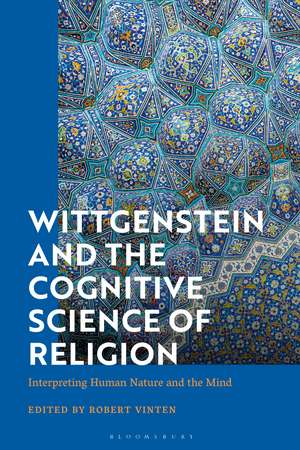Wittgenstein and the Cognitive Science of Religion: Interpreting Human Nature and the Mind
Editat de Dr Robert Vintenen Limba Engleză Hardback – 12 iul 2023
Preț: 510.92 lei
Preț vechi: 731.49 lei
-30% Nou
Puncte Express: 766
Preț estimativ în valută:
97.78€ • 101.95$ • 81.26£
97.78€ • 101.95$ • 81.26£
Carte tipărită la comandă
Livrare economică 20 martie-03 aprilie
Preluare comenzi: 021 569.72.76
Specificații
ISBN-13: 9781350329355
ISBN-10: 1350329355
Pagini: 256
Dimensiuni: 156 x 234 mm
Greutate: 0.53 kg
Editura: Bloomsbury Publishing
Colecția Bloomsbury Academic
Locul publicării:London, United Kingdom
ISBN-10: 1350329355
Pagini: 256
Dimensiuni: 156 x 234 mm
Greutate: 0.53 kg
Editura: Bloomsbury Publishing
Colecția Bloomsbury Academic
Locul publicării:London, United Kingdom
Caracteristici
Examines Wittgenstein's philosophy and the cognitive science of religion in the first book-length treatment
Notă biografică
Robert Vinten was formerly the postdoctoral research fellow in the project Epistemology of Religious Belief: Wittgenstein, Grammar and the Contemporary World at Universidade Nova, Portugal. He is currently commencing a new project concerning epistemic injustice.
Cuprins
List of FiguresList of ContributorsAcknowledgementsIntroduction, Robert Vinten (New University of Lisbon, Portugal)1. Wittgenstein, Concepts and Human Nature, Roger Trigg (University of Warwick, UK) 2. On Truth, Language and Objectivity, Florian Franken Figueiredo (New University of Lisbon, Portugal)3. Pascal Boyer's Miscellany of Homunculi: A Wittgensteinian Critique of Religion Explained, Robert Vinten (New University of Lisbon, Portugal)4. The Brain Perceives/ Infers, Hans Van Eyghen (Tilburg University, The Netherlands)5. The Imaginary Inner Inside the Cognitive Science of Religion, Christopher Hoyt (Western Carolina University, USA)6. Cognitive Theories And Wittgenstein: Looking For Convergence Not For Divergence, Olympia Panagiotidou (Aristotle University of Thessaloniki, Greece)7. Wittgenstein, Naturalism, and Interpreting Religious Phenomena, Thomas Carroll (The Chinese University of Hong Kong, Shenzhen)8. Natural Thoughts and Unnatural Oughts: Lessing, Wittgenstein, and Contemporary CSR, Guy Axtell (Radford University, USA)9. Normative Cognition in the Cognitive Science of Religion, Mark Addis (London School of Economics, UK)10. Brains as the Source of Being: Mind/Brain Focus and the Western Model of Mind in Dominant Cognitive Science Discourse, Rita McNamara (Victoria University of Wellington, New Zealand)11. On Religious Practices as Multiscale Active Inference: Certainties Emerging From Recurrent Interactions Within and Across Individuals and Groups, Inês Hipólito (Humboldt University, Germany) and Casper Hesp (University of Amsterdam, the Netherlands) ReferencesIndex
Recenzii
Wittgenstein and the Cognitive Science of Religion fills a gap in the literature exploring in illuminating and provocative ways how Wittgenstein's thought can be profitably used in the emerging field of cognitive science of religion.
This collection of essays, edited by Robert Vinten, explores naturalism as an approach to religion, thus continuing the path of Hume or Freud. Its originality lies in not taking naturalism for granted, rather seeing it under the critical light of Wittgenstein.
This collection of essays, edited by Robert Vinten, explores naturalism as an approach to religion, thus continuing the path of Hume or Freud. Its originality lies in not taking naturalism for granted, rather seeing it under the critical light of Wittgenstein.
